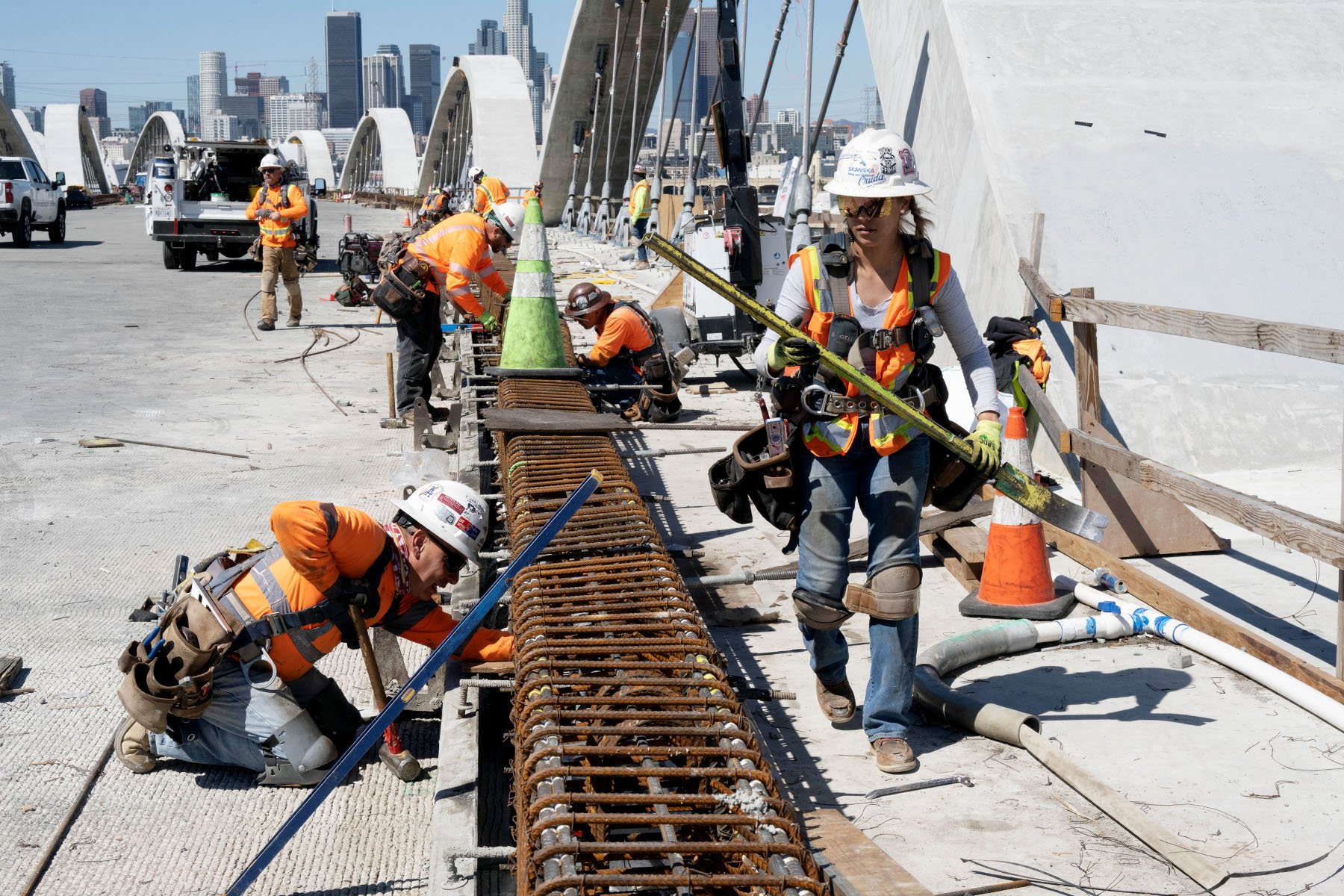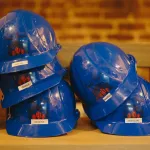We’re telling the untold stories of women, women of color and LGBTQ+ people. Sign up for our daily newsletter.
As the construction industry booms, the longstanding issue of discrimination and sexual harassment is still running rampant on job sites.
A recent report from the U.S. Equal Employment Opportunity Commission (EEOC) documents that women and people of color are being denied jobs, being harassed and subjected to other workplace abuses.
Charlotte Burrows, chair of the EEOC, the federal agency that investigates complaints of job discrimination, described some of the cases that have come before the agency as “egregious.”
The construction industry employs around 11.8 million people as of 2022, with trillions of federal dollars from recent legislation powering years of future job growth. In theory it should represent an opportunity for many Americans to move into the middle class.
Most trades offer paid training through apprenticeships and don’t require a college degree. They also typically come with salaries much higher than the minimum wage — the median salary of a construction laborer is $42,970 and $59,300 for an electrician, according to the U.S. Bureau of Labor Statistics.
There is also a shortage of workers, leaving money on the table for companies that can’t fill contracts fast enough. As of 2021, 89 percent of contractors were having a hard time finding workers, according to the Associated General Contractors of America, an association for the construction industry.
-
Read Next:
And yet: “This is an industry where we still have folks saying, ‘We just don’t hire women,’” Burrows told The 19th.
The report details several instances in which the EEOC found companies had discriminated against people because of their race or gender in the hiring process. In multiple cases, job applicants were told simply that companies they had applied to were not going to hire women. In other instances, apprenticeship programs denied opportunities to Black applicants.
Women make up 4 percent of construction trades workers, and 11 percent of the workforce overall when accounting for administrative positions. Black workers account for 7 percent of workers.
When women did get hired, harassment often drove them out, impacting their ability to earn better wages.
“When we talk about the gender pay gap, it’s not just I’m going to pay you less in dollars and cents but also, what happens to your paycheck when you have to leave a job or an industry because you can’t take the harassment?” Burrows said.

The report details cases that have come before the EEOC, including incidents of sexual harassment in which women were groped, or commonly subjected to jokes, comments and workplace graffiti that sexualized them. In 2021, the Institute for Women’s Policy Research surveyed workers who identified as women and found that 26.5 percent of respondents said they were ”always or frequently” harassed for being a woman.
LGBTQ+ people also faced workplace abuses. In that same IWPR survey, 19 percent of LGBTQ+ respondents said they were always or frequently harassed due to their sexual orientation.
In response to the report’s findings, Sean McGarvey, president of the North America’s Building Trades Unions (NABTU), a labor organization that represents more than 3 million trades workers in the United States and Canada, issued a statement: “Harassment or discrimination in any form cannot be tolerated on construction sites, and, as we have said repeatedly, the construction industry can and must do more to prevent these terrible and pervasive workplace issues.”
Melissa Wells, special assistant to the president of NABTU, said the organization is undertaking several initiatives to make the trades more hospitable to women and people of color, including creating a voluntary project certification in collaboration with the federal government and other partners to incentivize a safe workplace culture.
While still in the early stages of development, the national certification would be a way to encourage contractors to maintain a safe and welcoming workplace culture and ensure there are reporting protocols in place when an incident does occur. It would work similarly to the LEED certification process, which incentivizes and upholds green building standards.
“Our goal is that this will have teeth,” Wells said. “We want there to be accountability measures.”
-
Read Next:
Reporting harassment on a jobsite is complicated in the construction industry, Burrows said. A worker may be unsure of who to report to when there are multiple contractors and companies involved for a single project, adding to the pervasiveness of the problem.
“It’s terribly confusing for an employee who’s just trying to get some oversight and trying to get some relief,” she said.
NABTU launched a tradeswomen committee program this year that would help address this issue as well. The first three committees formed in Chicago, Las Vegas and D.C., and are housed within local building trades councils. They are a way to empower and train women in the trades but will also work with local unions on initiatives to better recruit and retain women. The committees can also serve as a mechanism for informing a council about an incident of harassment.
“In reality when these incidents happen … tradeswomen on the job maybe don’t know how to quite respond but they’ll usually go to trusted people to talk about it,” Wells said.
Donna Hammond, interim executive director and founding member of Oregon Tradeswomen, a nonprofit that works to ensure women have access to the trades workforce, said she appreciates the research conducted by the EEOC.
“We needed this report,” Hammond said. “ [Now] everyone gets to share this report that’s telling the truth about our industry, because everybody doesn’t feel the same.”
She recounted how after the murder of George Floyd, the local chapter of her union, the International Brotherhood of Electrical Workers, distributed anti-racism stickers. She said a couple of White men sent their stickers back.
When she asked why, they told her it was because they’d never witnessed racism — or sexism — on the job. To Hammond it was indicative of a bigger problem.
“If you’re a White guy and you’ve never had any women or people of color on your job, you would never have seen any racism or sexism.”
However, as the EEOC report points out, racism is pervasive on job sites. Between 2015-2022, alone, the agency received at least 64 charges related to nooses hung on construction sites.
Hammond, a Black woman who worked for four decades as a union electrician, is adamant that there are also a lot of allies in the industry who want to do the right thing and who have helped her succeed in her own career. But still, she said, the report illustrates the need of highlighting the problem and finding solutions quickly.
“How do we really use this report and who can we contact for the next steps to work with the EEOC as they try and implement?” she asked. “There are a lot of improvements that could happen, especially with what is happening with the mega projects. They need us, so how do we really work together?”
Burrows said it is a priority to work together with unions, trades women organizations, and civil rights groups on addressing this issue.
Jennifer Todd, president and founder of LMS General Contractors, a company that does demolition and remediation work in South Florida, points out that this issue of discrimination has been persistent for decades. She is skeptical around the motivations of tackling it now.
“The reason why the problem is being highlighted at this point is not because of the continued injustice, it is because of the labor shortage.”
Usually, change doesn’t happen unless it starts to impact the masses, Todd said, and in this case general contractors and construction companies are seeing what happens when a large percentage of the population has been left out for so long. Todd, like others interviewed for this piece, emphasized the need to focus on keeping women and people of color in the industry.
“We see all of these apprenticeship programs and outreach and collaborative efforts. But you don’t hear much talk about retaining the existing workforce who continue to leave at a rapid rate because they don’t feel safe and welcomed,” she said.
In 2019, Todd, who is a Black woman, started her own initiative, A Greener Tomorrow, which aims to recruit women and people of color into trade work. The initiative came out of her work on affordable housing projects, where she offered jobs to tenants to work on her construction projects.
“What we found was that people want to work when given the opportunity,” she said. “If you train them, they will come to work, they will show up. They just need the tools, and they need the opportunity to do so.”








